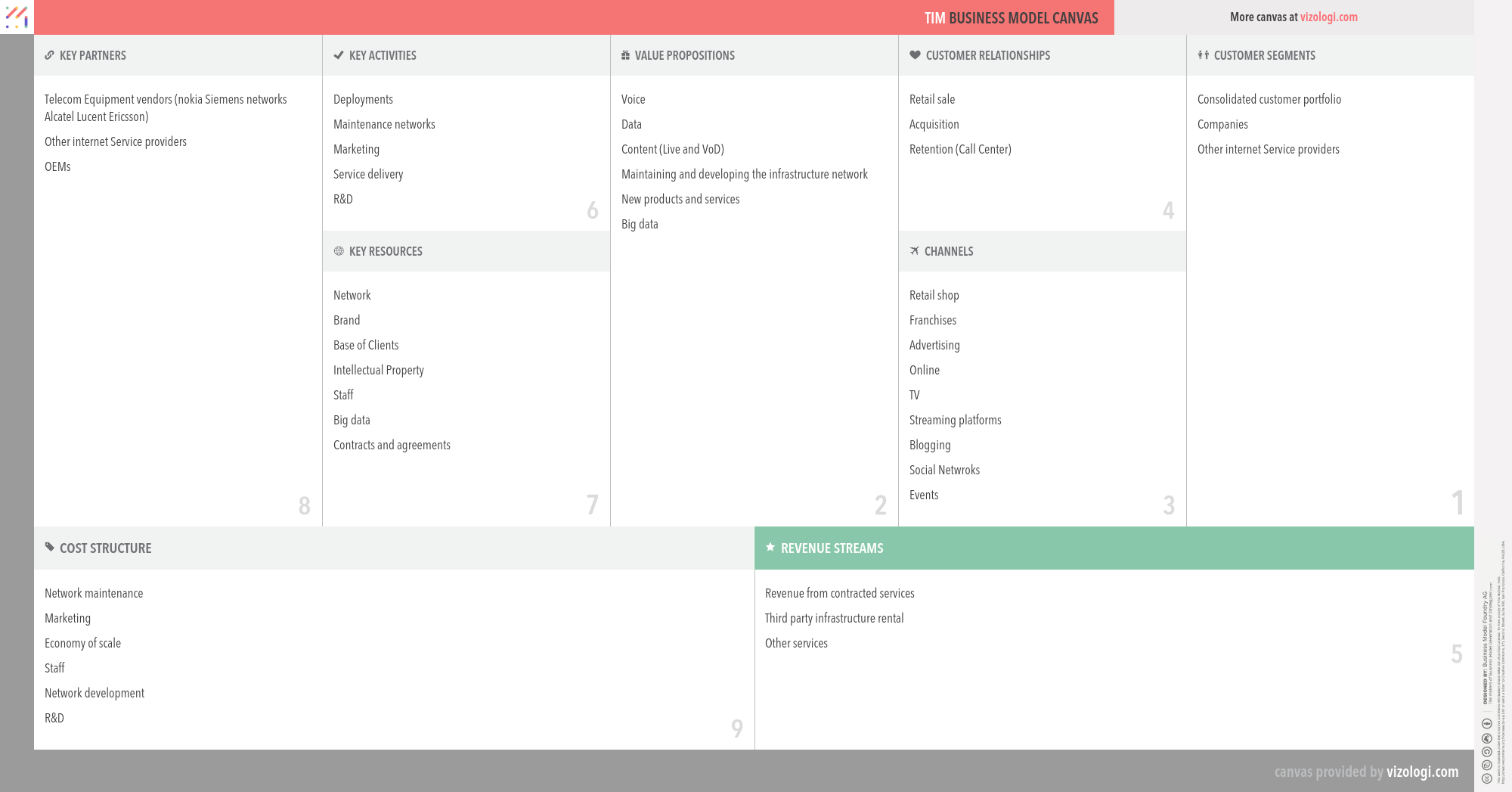Why Tim's Business Model is so successful?
Get all the answers 
Tim’s Company Overview
TIM Hellas Telecommunications SA is at the forefront of mobile communications in Greece and its brand stands for innovative products and services. TIM Hellas is the technology leader of its industry since it was the first operator to launch GSM mobile services in Greece in 1993 and also the first operator to offer its customers UMTS services as early as the beginning of 2004. TIM Hellas today offers more than 200 value Added Services and varied tariff plans to suit the needs of the private and business market in Greece.
www.tim.itCountry: Italy
Foundations date: 1995
Type: Private
Sector: Telecommunications
Categories: Telco
Tim’s Customer Needs
Social impact:
Life changing: affiliation/belonging
Emotional: badge value, design/aesthetics, fun/entertainment, attractiveness, provides access
Functional: integrates, connects, simplifies, avoids hassles, informs, quality, variety, saves time
Tim’s Related Competitors
Tim’s Business Operations
Augmenting products to generate data:
Due to advancements in sensors, wireless communications, and big data, it is now possible to collect and analyze massive quantities of data in a wide range of settings, from wind turbines to kitchen appliances to intelligent scalpels. These data may be utilized to improve asset design, operation, maintenance, and repair or improve how an activity is carried out. Such skills, in turn, may serve as the foundation for new services or business models.
Bundling:
Multiple products or services have been bundled together to enhance the value. Bundling is a marketing technique in which goods or services are bundled to be sold as a single entity. Bundling enables the purchasing of several goods and services from a single vendor. While the goods and services are often linked, they may also consist of different items that appeal to a particular market segment.
Cross-selling:
Cross-selling is a business strategy in which additional services or goods are offered to the primary offering to attract new consumers and retain existing ones. Numerous businesses are increasingly diversifying their product lines with items that have little resemblance to their primary offerings. Walmart is one such example; they used to offer everything but food. They want their stores to function as one-stop shops. Thus, companies mitigate their reliance on particular items and increase overall sustainability by providing other goods and services.
Customer relationship:
Due to the high cost of client acquisition, acquiring a sizable wallet share, economies of scale are crucial. Customer relationship management (CRM) is a technique for dealing with a business's interactions with current and prospective customers that aims to analyze data about customers' interactions with a company to improve business relationships with customers, with a particular emphasis on retention, and ultimately to drive sales growth.
Decomposition:
Simplifying many product kinds inside a product group or set of goods. A technique for doing business analysis in which a complex business process is dissected to reveal its constituent parts. Functional decomposition is a technique that may be used to contribute to an understanding and management of large and complicated processes and assist in issue solving. Additionally, functional decomposition is utilized in computer engineering to aid in the creation of software.
Enterprise unbundled:
Unbundling is a business practice that recognizes that a company may have three primary focuses: client connections, product innovation, and infrastructure. Moreover, three of these elements may coexist in big businesses, creating a complex model that needs significant resources to operate effectively. Thus, unbundling is a crucial idea for any enterprise's future success. Additionally referred to as deconstruction or disaggregation, this benign word refers to a dominating force that propels digital change into the heart of whole sectors.
Recommended companies based on your search:

